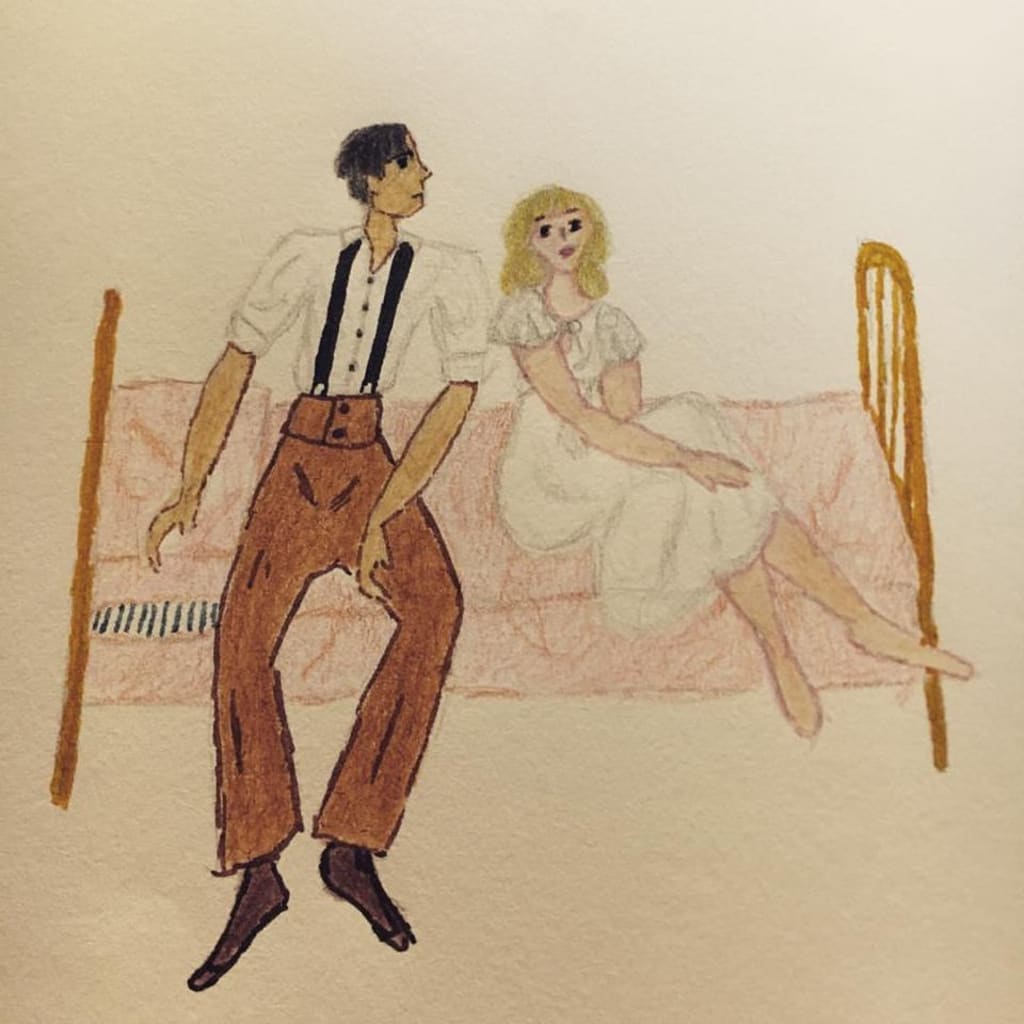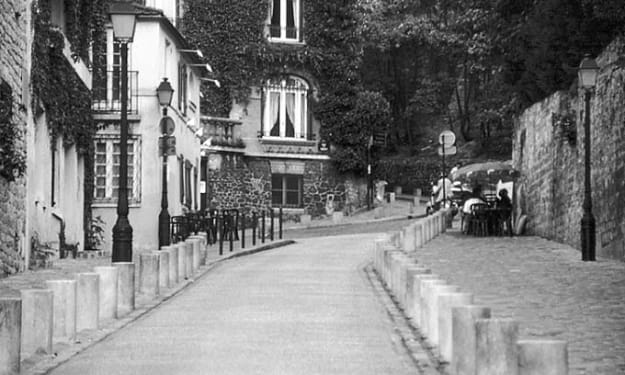Retribution: Chapter 32
Marianne's New Life

A summer-like heat wave hit Paris at the beginning of May: a week of dry, heavy, and sultry days. At the height of this hot spell, Charles and Adèle opened up their swimming pool. With a pitcher of bee’s knees, the afternoon passed pleasantly. Charles was bringing Adèle, who was sitting on the diving board, another cocktail when Benoît came outside and announced that Madame Brady was there to see them.
“Show her out here,” Charles told him.
Adèle walked over to kiss Sarah’s cheeks when she appeared.
“Hot enough for you?” Sarah asked.
“It’s supposed to cool down tonight,” Adèle answered.
“The wisteria vines out front look lovely.”
“They’re our gardener’s pride and joy; I’ll send on your compliments.”
“Can I get you a drink?” Charles asked Sarah.
“What do you have?”
“Bee’s knees.”
“That’ll do.”
Adèle put on a pair peach colored beach pajamas over her white bathing suit.
“Tonight’s the opening of La Bayadère,” she informed Sarah, “I’ll have to get ready to leave in a few hours.”
“We have an extra ticket,” Charles joined in as he poured Sarah a drink, “Are you free tonight?”
“I would love to,” Sarah answered, taking the glass from Charles.
She took a seat at one of the patio tables. A number of newspapers were spread out on the table along with a photograph of a young girl with a halo of blond hair and a radiant smile.
Charles had promised to pick Sarah up around eight and take her to dinner before the ballet. They met Charlotte and Alexandre at the restaurant. The curtain rose at about ten to reveal a set made up of a model of the Taj Mahal, Arabic arches, and latticed screens. Adèle made her entrance as the stunning temple dancer Nikiya, tantalizingly shrouded in a gossamer veil which she slowly and seductively removed before dancing.
“Who was the lovely young creature in the photography you had on the table?” Sarah whispered to Charles.
“My daughter, Marianne,” he answered.
“I think I’ve seen her before.”
“Where?”
“At an antique shop in Montmartre called Trésors Trouvés. She was wearing a large straw hat.”
“Where is Trésors Trouvés?”
“I forget the exact street, but it’s close to Sacre Coeur.”
Adèle shone in the role of Nikiya. Her performance was particularly poignant in her death scene, where Nikiya dies from the bite of a poisonous snake hidden in a flower basket by her rival, Gamzatti. Towards the end of the second act, Solor, Nikiya’s lover, has an opium fueled dream of his deceased beloved dancing with other spirits, dressed in diaphanous white chiffon and gauze.
When Adèle returned to her dressing room to the sound of booming applause, she found a fiery wreath of yellow, red, and orange marigolds sent to her from her husband.
Marianne found that her new life in Montmartre was surprisingly ordinary. She and Augustin woke up every morning, entwined in each other’s arms and then had breakfast together before he set out for the day. Her position in Faucherie’s household was something between a secretary and a housekeeper. She tidied up the house, ran errands, answered the door and the telephone, took notes and fetched things for Faucherie when whatever else was needed to be done. Augustin would come home in the evening, hang up his hat, kick off his shoes, and throw himself on the sofa with his head in her lap. She would read aloud from The Odyssey until dinner. Often he would interrupt her to talk about what he had done or some stream of conscious thought he had, like how the Cyclops reminded him of fat old Père Fameuil, the bouncer at one of the gambling dens that Faucherie had a stake in, who was every bit as ugly and stupid. After dinner, they would listen to the radio; the men would go up onto the roof for a smoke while she worked on a needlepoint pillow she had started and Hélène brewed up her special tea.
The only complaint that Marianne had with her new life was that she was often lonely. During the day, Hélène was the only other person around. She would sleep in till noon, make herself a cup of black coffee and a piece of toast, and then head out for a few hours, come back and spend the rest of the afternoon at the piano, only exchanging a few words of small talk with Marianne in the process. Hélène was polite, almost friendly, with her but was not one for confidential girl talk.
Whenever she was hit by a bout of restlessness, Marianne found that the best cure was a long walk. She liked to pop into Montmartre’s many art galleries and antique shops and make her way up to the summit of the hill, light votive candles in Sacre Coeur, and say prayers for the souls of her mother and grandparents. On her way back, she would stop in a cafe across from the Moulin Rouge, a gaudy shadow of its belle époque splendor. The table where she usually sat was not on the main patio but on a sidewalk which ran alongside the cafe. A balding, pot bellied middle aged man would often park his shabby old car across the street during his lunch break and enjoy a sandwich.
One day, out of nostalgia, Marianne ordered a diabolo menthe, something she had not drunk in years. As a convent schoolgirl, she and her classmates had been allowed to go into the nearby village for a few hours once a week. A popular haunt was a place called Bellamy’s candy shop, where they would drink whatever soda was the flavor of that month and think they were so very grown up.
“Marianne,” a deep male voice said to her. A large rough hand touched her shoulder.
She turned around to see her father standing behind her.
“Monsieur,” she responded.
“Will you be joining Mademoiselle?” asked the waiter who was bringing Marianne’s diabolo menthe.
“Yes,” Charles responded as he pulled up the other chair at the table and sat down.
“What can I get you?”
“Coffee with milk please.”
Across the way, the man in the broken down heap of a car had finished his sandwich. He blew a kiss to Marianne and drove away.
“Do you know him?” Charles asked her.
“No, not at all,” she replied, taking a sip of her diabolo menthe.
“Aren’t you a little old to be drinking that?”
“What are you doing here?”
“Do you sometimes go into a shop called Trésors Trouvés?”
“Yes.”
“Did you once talk about a pair of porcelain figurines with an American lady?”
“Perhaps.”
“That’s how I was able to find you.”
“So you’ve been having me followed?”
“Your aunts and I have been worried about you.”
“Where was all this concern when Edmond wouldn’t leave me alone? Where has all this concern been for twenty years?”
“Watch your mouth, young lady! You’re still not too big for me to throw over my knee and paddle.”
“I guess that’s how some men can only deal with women, by beating them into submission.”
“Your lover, how does he treat you?”
“Like a porcelain doll.”
“Then what is that on your arm?”
Several purple and yellow fingerprint shaped bruises marked her upper arm. She adjusted the sleeves of her blouse to cover them up. Charles extended a comforting and affectionate hand to her.
“Darling…”
“Don’t call me darling.”
She put the money for their drinks on the table, then got up and left. Charles decided that he should do the same. Walking away was uncomfortable for him; his bad knee was acting up again. He playfully thought to himself that if he had thrown Marianne over his knee and spanked her, it would have hurt him as much as it hurt her.
Marianne stopped at a market on the way home to buy some mushrooms because she had promised Monsieur Faucherie that she would make casserole à la Champignons for dinner that night.
When she walked through the door, she found Augustin in the living room, playing tug of war with Johnny using a piece of old rope.
“Be careful, he cheats,” Marianne warned him.
Johnny grabbed the rope near the end that Augustin was holding and nearly bit Augustin’s hand.
“Watch it, you little mutt,” Augustin grumbled.
Marianne went into the kitchen and turned on the faucet over the sink and rinsed off the mushrooms. Augustin came in, stood over her, and kissed her on the neck.
“How was your day?” he asked her.
“I ran into my father,” she responded, “He’s figured out where I am.”
“How?”
“Apparently I talked with a woman in a shop, who turned out to be a friend of his. She told him that I’m in Montmartre.”
Augustin lightly put his hand on her shoulder; his fingers lightly touched the bruises on her upper arm.
“He must think I’m rough with you.”
“Let him think what he likes.”
A number of Faucherie’s cronies dropped by that evening. They gathered in a small back room which was filled with a long table with chairs around it and crates filled with enough weapons to fight a small war. One of them was a man named Babet, who Augustin had taken to mocking with the name of “bouledogue,” because of his jowly face and gruff manner. Babet sat polishing his pistol with an old rag as Faucherie briefed everyone on the next heist. Anton-le-Basque, who has hiding out in Marseilles with his mistress, had given them a tip about a shipment of money orders coming into Paris. Babet was offered the job of being one of the gunmen.
“Are you up for the job, Bouledogue?” Augustin taunted, “Or is that pretty pistol just for show?”
“Listen, boy,” Babet responded, “I was doing this when you were still pissing in your diapers. Now, shut up and let the grown-ups talk.”
Faucherie got up from his chair, opened the door, and whistled a tune. Marianne appeared.
“What can I get you, Monsieur Faucherie?” she asked him.
“Get a bottle of wine and some glasses and the cigar box,” Faucherie responded.
Marianne quickly returned with all of the items on a tray.
“What a good little bird you are.”
“What’s a sweet little thing like her doing here?” one of the men whispered.
“She’s about the same age as my daughter,” another added.
“So is your latest wife.”
“Marianne, will you bring me another plate of that delicious mushroom casserole?” Faucherie continued.
“Coming right up, Monsieur.”
She disappeared back into the kitchen.
“Augustin, there’s another gunman position in the gang. Are you ready to graduate to playing with the big kids?”
Augustin was hesitant.
“You said you were planning on going to hiding out in Egypt and Algeria. After this job, you take your share, go abroad, and use your money wisely, in a year or two, you and Marianne will be living like sultans from the Arabian Nights.”
“Sounds like a good plan,” Augustin answered.
“Do you think you could shoot a man if you need to?”
“It’s either shoot or be shot, isn’t it?”
“That’s my boy.”
By this point, Marianne had returned with Faucherie’s plate of casserole.
“I think he’s just showing off for Mademoiselle over here,” Babet sneered.
“I’ve brought down a tougher man than you.”
Babet eyed him skeptically and smirked assuming he was still showing off.
The coolest part of the house later in the day was the rooftop deck. After Faucherie’s guests had left, Marianne went to go sit up there. She had brought up a pitcher of water scented with dried lavender and dabbed herself with a damp rag. The sweet smelling water felt heavenly on her overheated skin.
On the lower deck, she could hear footsteps and men talking.
“Now Augustin,” she heard Faucherie say, “What’s this you’ve been saying about that Camille Dupont fellow?”
Camille Dupont, Marianne thought, Manon’s brother?
Augustin was hesitant at first to tell the story, but Faucherie gauded and coaxed him on. From the little the Manon had told her about Camille, Marianne could tell that he was unpleasant and possibly cruel. Augustin’s words painted an even darker picture. What he had suffered at the hands of Camille was apparently traumatic; his voice sounded as though he was holding back tears.
“And so I killed him. I stabbed him in the showers and made it look like a suicide,” Augustin finished after regaining his composure.
Marianne put her rag into the lavender water and then rung it over her head. A cool breeze whipped at her thin rayon clothing and made her shiver a little bit. She shook her head, trying to shake the words from her mind. She had not just heard that her lover had killed her friend’s brother.
Augustin and Faucherie looked up and smiled to see her up there in only her lingerie. Faucherie went back inside while Augustin climbed the steps up to the rooftop deck.
“What did you hear?” he asked her.
“Everything,” she responded.
He unbuttoned his shirt and took it off. She soaked the rag again and rung it out over him.
“Ahh, that’s nice,” he sighed, shaking his wet head like a dog.
“I understand why you killed him. It sounds like Camille Dupont was a monster and did things to you that no one should have to suffer.”
“I don’t regret killing him, Marianne,”
“I don’t regret it either. If I was there, I would have delivered the coup de grace.”
He laughed and kissed her temple.
They went to take a look at a nearby apartment during the next afternoon saying they were an engaged couple looking for a place to live once they were married. It was an airy, pleasant place with large windows which provided plenty of sunlight and a view of Sacre Coeur. The real estate agent looked at Augustin as someone he should envy: well dressed, obviously monied, with a pretty and adoring fiancée on his arm.
Marianne looked around the main room and smiled as if to say “I could be happy here.” Having a home of their own was a far away dream but one that was not too far away.
Johnny waited for them at the front door of Faucherie’s townhouse like a miniature Cerberus at the gates of Hell. Hélène greeted them as they walked in.
“Would you like tea or coffee?” she asked.
Augustin responded coffee. Marianne responded tea.
“I’m singing at Le Monstre tonight,” Hélène told them, “Would you two be interested in coming?”
“Sounds like fun,” Marianne responded.
“I wouldn’t drink any of that tea tonight,” Augustin told Marianne, “I don’t know what that witch, Hélène, puts in her tea but it puts you out like a light. I hope there’s nothing unsavory it in. Your aunts wouldn’t like it if we turned you into a dope fiend.”
“There’s no dope in it! Just good old fashioned bourbon.”
“What time do you come on?” Marianne asked Hélène.
“Ten o’clock.”
They left to go to Le Monstre around nine o’clock. Augustin climbed down the steep stairs and walked in with Marianne on his arm as the band was playing swing music. He swept her up into a rambunctious lindy hop. When the song had finished, he went to bar to get them drinks. Standing next to him at the bar was another young man, about his own age. He was several inches taller than Augustin, blindingly handsome, and impeccably dressed and was watching Marianne as she swayed and bopped around on the dance floor.
Once had a gotten the drinks, Augustin walked up to Marianne and handed one to her.
“Thanks,” she said.
He took her other hand, the one which wore the silver ring he had given her months earlier.
“I think it's time I made good on my promise. Faucherie knows of a clerk at the Mairie who won’t ask too many questions and a priest at Sacre Coeur who will keep quiet. What do you say we make it official this Sunday?”
She threw her arms around his neck and kissed him.
“Yes!” she answered.
After telling Faucherie and Hélène their news, Augustin returned to the bar to get champagne. The handsome and well dressed young man from earlier had also returned. Again, he was watching Marianne, as she talked with Hélène about going to buy a wedding dress.
“Do you know that girl?” the young man asked.
“She’s my fiancée,” Augustin responded, “We’re going to be married on Sunday.”
“Congratulations, you’re a lucky man.”
He went to go join a tall dark haired girl sitting at a nearby table, dressed in a sparkling green evening dress which made her look like a mermaid.
The upcoming marriage was celebrated with bottle after bottle of champagne. Augustin drank more glasses than he could count. Back at home, Marianne fetched him a glass of water and a couple of aspirin tablets.
He always tried his best to keep up with the hard drinking men he associated with, but Marianne knew that he was something of a lightweight when it came to alcohol. After a bottle or two of champagne, he would be out like a light.
“Here, take this,” she told him.
Augustin gulped down the glass of water and swallowed the aspirin tablets.
“Now sleep off some of that champagne.”
“Don’t talk to me like a child, Marianne.”
“I’m not, now go to bed like a good boy.”
Sure enough, her husband-to-be was soon snoring contentedly, lost to the world.
About the Creator
Rachel Lesch
New England Native; lover of traveling, history, fashion, and culture. Student at Salem State University and an aspiring historical fiction writer.






Comments
There are no comments for this story
Be the first to respond and start the conversation.